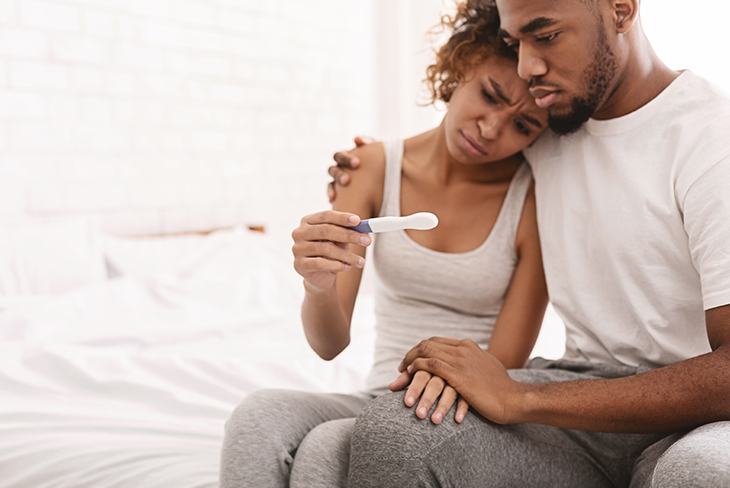Male infertility: What you should know

When a couple is struggling to get pregnant, the female is often blamed. However, in over a third of couples, male infertility could be the issue.
Infertility in men
Male infertility occurs when a certain health issue in a man lowers the chances of his female partner falling pregnant. According to the Urology Care Foundation, 13 out of 100 couples can’t get pregnant with unprotected sex.
Causes of infertility in men
Dr Sulaiman Heylen, a specialist in reproductive medicine at Life Kingsbury Hospital, says male infertility is diagnosed using a semen analysis test that checks for any abnormalities. ‘We always start fertility testing with a semen analysis. Semen analysis is very easy and inexpensive.’
Dr Heylen lists the following as possible causes of male infertility;
- Varicocele: these are varicose veins of the testes. They can contribute to up to 30% of all cases of male infertility.
- Trauma of the testicles, related to accidents or sports injuries.
- Sexually transmitted disease, which can lead to infections of the testes and blockage of the epididymis (tubes of the testes).
- Mumps of the testes.
- Pollution and environmental factors (oestrogen-like factors in the environment): these are called xenoestrogens. Oestrogen is the female hormone. Xenoestrogens are chemical compounds that mimic oestrogen. There is more and more evidence that pollution and environmental factors can contribute to male infertility.
- Unhealthy lifestyle: obesity, excessive alcohol consumption, smoking and drugs. Anabolic drugs are known to cause low sperm counts.
- Antibodies that attack sperm: anti-sperm antibodies are immune system cells that mistakenly identify sperm as harmful invaders and attempt to destroy them.
- Undescended testes: during foetal development, one or both testicles sometimes fail to descend from the abdomen into the scrotum.
- Genetic: there are genetic defects in the chromosomes or small Y-chromosome defects.
- Unknown: we cannot always identify the cause of low sperm count.
Male infertility diagnosis
Dr Dap Louw, a urologist from Life Beacon Bay Hospital, explains that the physical examination involves:
- A general exam
- Evaluation of the testes (volume, masses, varicocele, infections)
- A prostate exam, if needed
‘The evaluation starts with a thorough medical history. We normally do a pelvic and scrotal ultrasound as well to evaluate the testicular tissue and to look for signs of sperm-transport blockage. When there is little or no sperm, methods aimed at distinguishing between abnormal sperm production and blockage of sperm transport will be used,’ he says.
Infertility treatment
Dr Louw explains that treatment is aimed at the underlying problem, whether it is advice on a healthier lifestyle, surgical correction of a testicular abnormality or medically treating underlying infection, sexual dysfunction or hormonal abnormality. ‘When there is no urological correctable contributing cause to infertility, a multidisciplinary approach is taken and infertility specialists and/or gynaecologists are involved,’ says Dr Louw.
‘We then consider further treatment, depending on their hormonal levels, semen analysis and female factors. These can vary from medical treatment, sperm washing with artificial insemination, IVF (in vitro fertilisation) or ICSI (intracytoplasmic sperm injection).’ Dr Louw always emphasises to his patients that 20–30% of subfertile couples end up falling pregnant without any further help, which is positive, as nature is on their side.
Protect your relationship during fertility treatment
Infertility can make or break your relationship, depending on how it is managed, says Dr Liezel Anguelova, counselling psychologist at Life Roseacres Hospital. ‘It will put your relationship to the test, but if you focus on the importance of your relationship, it could be used as an opportunity to make your relationship stronger.’
She shares some tips for surviving infertility:
- Wait for each doctor’s visit to gather information on the process before making decisions and planning ahead.
- Communicate openly and honestly to address unmet expectations, fears, frustrations and stress.
- Find professional assistance and counselling if you are not communicating effectively.
- Do not get caught in a blame game, but rather become committed as a team.
- Keep your sexual relationship spontaneous, and nurture intimacy by touching, hugging and kissing even when there is no sexual connotation.
- Do not merge your entire life with the fertility-treatment process. Continue with other hobbies and dreams.
- Build a support system. Support each other and include friends and family in the process.
The information is shared on condition that readers will make their own determination, including seeking advice from a healthcare professional. E&OE. Life Healthcare Group Ltd does not accept any responsibility for any loss or damage suffered by the reader as a result of the information provided.

